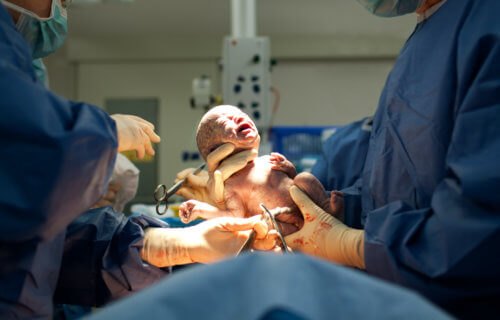CHARLOTTESVILLE, Va. — The first few moments after a child is born are always special for mom and dad, but a new study finds that each baby’s first breath triggers live-saving and life-long changes in breathing systems too. A team at the University of Virginia School of Medicine say their findings may prove invaluable in the fight against Sudden Infant Death Syndrome (SIDS).
Researchers say that when a child exits the mother’s womb and breathes for the very first time, that action activates a signaling system within the child’s brainstem that is responsible for early breathing regulation and support.
“Birth is traumatic for the newborn, as the baby has to independently take control over various important body functions, including breathing,” says Douglas A. Bayliss, PhD, chairman of UVA’s Department of Pharmacology, in a university release. “We think that activation of this support system at birth provides an extra safety factor for this critical period.”
Breathing is in the genes
While a baby develops in the womb, breathing is not necessary. While babies do breathe from time to time while in the womb, it is still quite a shock when they’re born and suddenly have to start breathing constantly. These discoveries are shedding some light on how the human infant respiratory system transitions from a very fragile state — easily susceptible to brain damage and deadly gaps in breathing — to a self-sufficient, largely automated physiological system that constantly supplies the body with healthy levels of oxygen.
For this study, researchers collaborated with colleagues from Harvard and the University of Alberta to perform a series of experiments on newborn mice. This led them to discover a specific gene that immediately turns on when a mouse is born. Located within a cluster of neurons within the mouse brain, this gene appears to regulate breathing in mice.
On a more detailed level, this gene creates a peptide neurotransmitter (PACAP) that activates as soon as the mouse is born. It then begins sending information between neurons.
Finding the key to preventing SIDS?
When study authors tried suppressing PACAP in mice, their breathing immediately deteriorated, with many dangerous pauses in breathing (apneas) occurring. Notably, these apneas seem to happen more often in response to changes in the environmental temperature. This suggests, according to the study, that the neuropeptide system has a connection to SIDS.
These new findings indicate neuropeptide system problems may increase an infant’s susceptibility to SIDS.
Sudden Infant Death Syndrome refers to the tragic scenario of a baby less than one year old passing away in an unexplained manner. Currently, scientists believe numerous genetic and environmental factors, such as temperature, causes SIDS. Unfortunately, it isn’t a rare occurrence, as SIDS is the leading cause of infant mortality in the Western world.
“These finding raise the interesting possibility that additional birth-related changes may occur in the control systems for breathing and other critical functions,” Bayliss concludes. “We wonder if this could be a general design principle in which fail-safe support systems are activated at this key transition period, and that understanding those may help us better treat disorders of the newborn.”
The study is published in Nature.
